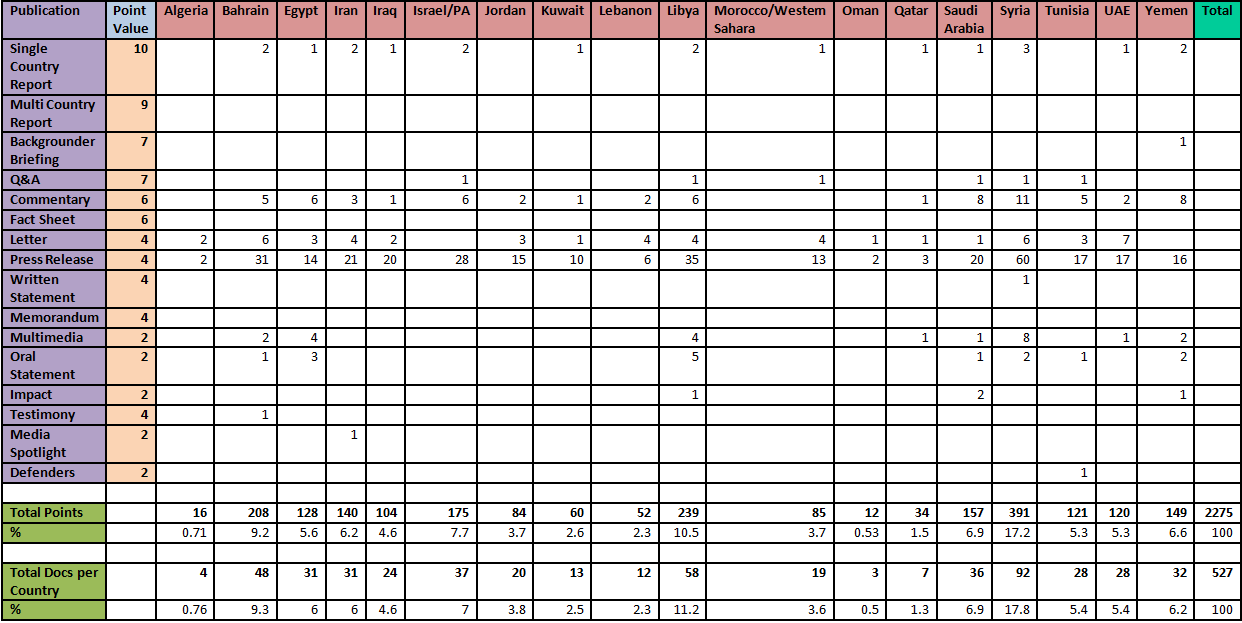Far Beyond the Curve: HRWs Bias and Lack of Credibility in 2012
Summary
Human Rights Watch (HRW) epitomizes the ongoing crisis and moral failure of powerful non-governmental organizations (NGOs) that claim to promote the universal principles of human rights. The following review of HRW’s 2012 activities, particularly in the Middle East, demonstrates that little has changed compared to previous years, and that the same individuals continue to control the organization’s agenda and activities.
In particular, HRW’s activities reflect the absence of professional standards and research methodologies; lack of expertise on international law and armed conflict; and a deep-seated ideological bias against democracies in general, and against Israel, in particular. Under the ongoing leadership of Kenneth Roth, these failings, that led HRW founder Robert Bernstein to condemn his own organization in the New York Times in 2009, have continued in 2012. As shown below, Roth’s obsession with Israel was particularly evident in his social media postings.
HRW’s deep bias and lack of credibility in 2012 was seen in:
- its failure to recognize and condemn the genocidal threats emanating from the leadership of the Iranian government (as highlighted in the Wall Street Journal and other media platforms);
- the conflict over Richard Falk’s membership and then forced resignation from an HRW board;
- criticism from women’s groups that Roth acted as “an apologist, not a senior human rights advocate,” in urging support for the new Muslim Brotherhood regimes in Egypt and Tunisia;
- a French newspaper, Liberation, reported that an investigator from HRW offered financial compensation for testimony related to Congolese rebel groups.
Rights violations and armed conflicts that are out of the media focus continue to get little to no attention from HRW. On Israel, while HRW issued fewer condemnations in 2012 in comparison to previous years, NGO Monitor’s quantitative analysis of HRW’s activities in the Middle East and North Africa (MENA) region for 2012 demonstrates that the emphasis continues to be the result of the mix between ideology and the degree of media attention to specific issues. This reflects the ongoing roles of Sarah Leah Whitson and Joe Stork, whose strong ideological agendas have severely distorted MENA’s priorities. Whitson remains MENA director, despite having endorsed the Qaddafi regime as human rights reformers – tainting all HRW statements on Libya – and having led HRW’s fund-raising trip to Saudi Arabia.
In November and December, in response to increased violence related to Gaza, the Palestinian statehood bid in the UN General Assembly, and other developments, HRW’s lack of a credible methodology and anti-Israel bias were further evidenced. Disproportionate condemnations of Israeli actions related to Hamas infrastructure erased vital contextual information. And, although HRW issued a statement on Palestinian rocket attacks from Gaza targeting Israeli civilians, this belated publication added no information to the conventional wisdom, and there was no public relations follow-up. In contrast, earlier in 2012, HRW invested significant resources in attempting to spin the court decision on the Rachel Corrie-ISM case for use in the ongoing demonization campaign against Israel.
HRW vs. Israel in 2012 – Content Analysis
Silence on Iran and Genocide
On December 4, 2012, David Feith published an op-ed in the Wall Street Journal, “Dancing Around Genocide,” which documented HRW’s consistent failure to condemn Iran’s calls to annihilate Israel. Feith disclosed internal emails between Executive Director Kenneth Roth and other members of the organization, in which Roth claimed that “Many of [Iran’s] statements are certainly reprehensible, but they are not incitement to genocide. No one has acted on them.” Feith…, concluding that “Tehran will continue to call for Israel’s obliteration—and Human Rights Watch will continue to sit back and watch.”
A second article on this topic, in Tablet (“The Human Rights Watch Internal Battle on Iran,” December 6, 2012), contained additional leaked emails from Roth. In one, Roth compared Iran’s religious rulers with a prominent Israeli rabbi, alleging that “Rabbi Ovadia Yosef’s statements [on Iran, Hezbollah, and Palestinians] are arguably more direct than those made by Iranian leaders, and Israel, unlike Iran, has the means to carry them out.” The author, Adam Chandler, criticized Roth for failing to acknowledge that Yosef’s remarks were condemned by the Israeli government and that “he is neither a head of state nor an official who sets government policy,” in contrast to the leaders of the Iranian regime.
This story was also covered in the Jerusalem Post, quoting NGO Monitor president Prof. Gerald Steinberg “This is a blatant example of Roth’s indifference to genocidal threats and human rights abuses when these target Israel. Roth…has consistently demonstrated an obsession with attacking the Jewish state, and the people he selected to lead HRW’s Middle East and North Africa division are also infected with this deep bias.”
In addition, in May 2012, HRW founder Robert Bernstein, Prof. Irwin Cotler, and Stuart Robinowitz published an op-ed in the Wall Street Journal, “Inciting Genocide Is a Crime.” While not mentioning HRW explicitly, they noted, “Silence is not a moral option when states threaten genocide—especially when they are on the verge of acquiring nuclear weapons and boast that they can bring about a holocaust in a matter of minutes.”
Roth’s silence and his “quibbling” regarding Iranian genocidal language was also discussed in The New Republic article about HRW “Minority Report,” Ben Birnbaum, April 27, 2010.
Operation Pillar of Defense
In 2012, the main military conflict involving Israel took place in November, when the IDF responded following escalating attacks from Gaza. In the wake of this 8-day conflict, HRW published 6 documents, including 5 press releases and a “Q & A”.
In these documents, as in its previous publications related to armed conflicts, HRW published faulty factual and legal analysis to accuse Israel of “unlawful” attacks against a home and against buildings used by journalists and the media. (The IDF targeted the communications arrays and antennas belonging to Al Aqsa and Al Quds TV, whose operations are an integral part of the Hamas military structure. Al Aqsa is listed as a Specially Designated Global Terrorist by the U.S. Treasury Department. In a tweet, Roth characterized these news outlets simply as “pro-Palestinian,” deceptively stripping away the essential context of terrorism and combat.)
These examples again highlighted the fact that HRW possesses neither the military expertise nor the necessary fact-finding methodology to make these assessments. (Such judgments require knowledge of the military intelligence possessed by Israeli commanders at the time of the strikes, and information on intent of the officers.) In both instances, HRW’s “evidence” for violating international law consisted solely of Israel’s refusal to explain its operational decisions to the NGO.
As in the past, (including a 2003 report on Palestinian suicide bombings), in order to present a façade of balance and credibility, HRW published a press release that condemned “Palestinian armed groups in Gaza” for violating “the laws of war during the November 2012 fighting by launching hundreds of rockets toward population centers in Israel.” (The short document was published on December 24, and was not the subject of an ongoing HRW public relations effort, in contrast to many of its statements on Israel.) It is significant to note that prior to the Israeli action, while numerous rocket attacks were launched from Gaza – each one a war crime – HRW had remained conspicuously silent.
Ken Roth’s Personal Animus
In the past decade, Executive Director Kenneth Roth’s obsession with Israel has been reflected in his op-ed articles and social media posts. For instance, in an op-ed ostensibly about eight countries other than Israel (“Barack Obama: Dump These 8 Unsavory Allies,” Foreign Policy, January 2, 2013), Roth opened with a lengthy attack against American support for the nation-state of the Jewish people. Using highly offensive rhetoric and false analogy, he criticized President Obama for refusing to stop the alleged “Jim Crow-like separate-and-unequal treatment of Palestinians in Israeli-controlled parts of the West Bank” and for condemning the politicized legal initiatives targeting Israel (“lawfare”) based on the Durban Strategy.
Roth has also used his Twitter account to accuse Israel of “Jim Crow” racism, imply that it is pursuing an “apartheid” policy, and engage in other strident attacks. In contrast, and evidencing his immoral bias, Roth excused gender segregation in Saudi Arabia. Examples include:
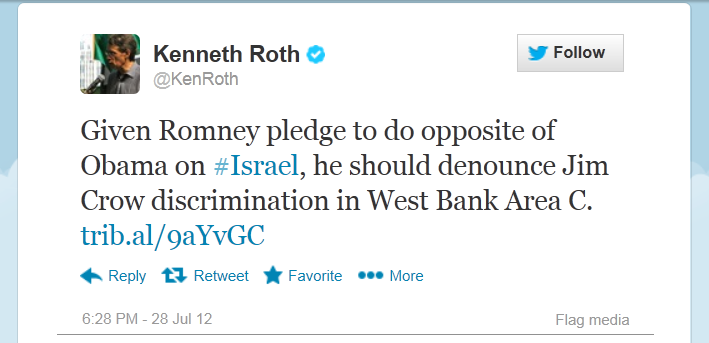 |
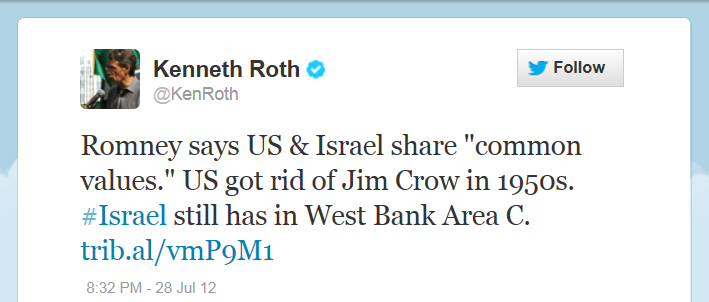 |
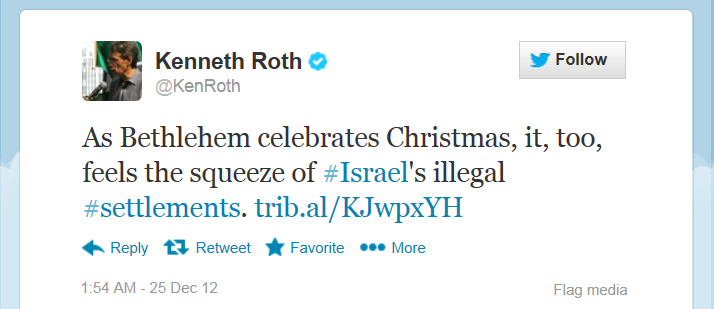 |
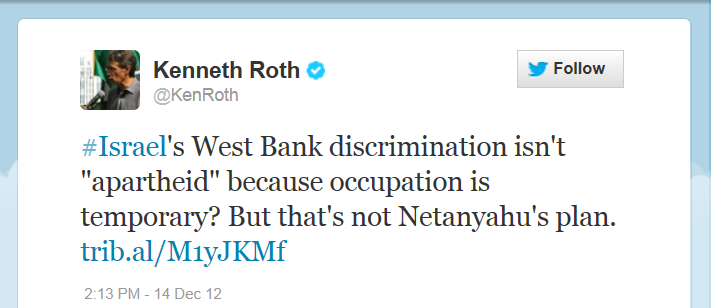 |
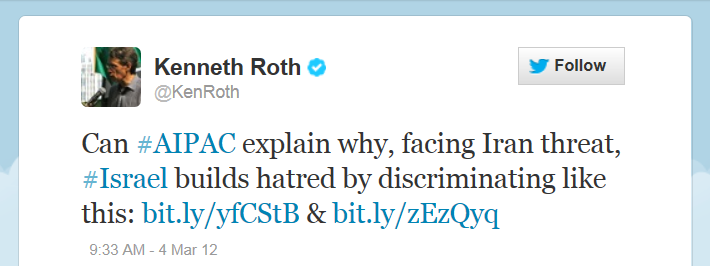 |
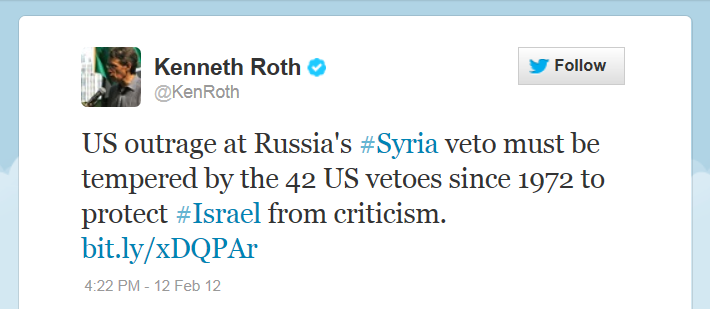 |
 |
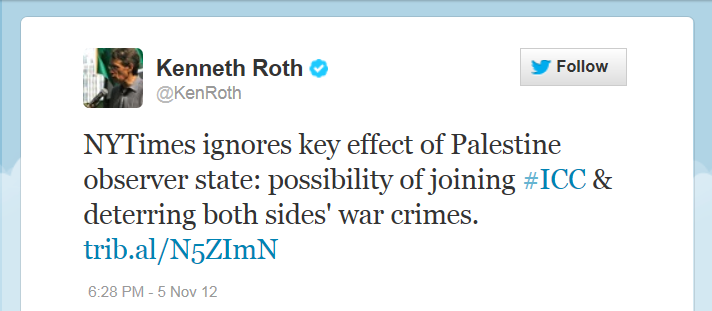 |
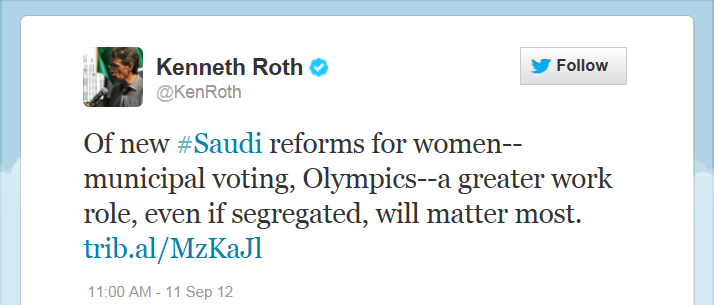 |
The UN General Assembly and Palestinian Statehood
In response to the November 29 UN General Assembly vote recognizing Palestine as a Non-member Observer State, HRW issued a press release under the heading “Newest ‘Observer State’ Should Act on Rights Treaties.” In it, HRW called on “Palestinian leaders [to] pursue ratification of core international human rights treaties and the Rome Statute of the International Criminal Court (ICC).”
This statement is part of HRW’s wider lobbying on behalf of ICC activism – which included playing a central role in its creation and formulating key articles in the statute – and specifically for opening an ICC case against Israeli officials. Along with the Arab League, the Palestinian Authority, and other NGOs, HRW submitted material to the ICC Prosecutor regarding the 2009 Gaza conflict, in the campaign to persuade him to open an investigation into Israel’s conduct.
HRW argues that “Palestinian ratification of the ICC statute would diminish the accountability gap for serious international crimes, including war crimes, and contribute to justice for victims of abuses.” In this respect, HRW is echoing the sentiments of Palestinian Authority President Mahmoud Abbas in his May 2011 New York Times op-ed, that the purpose of the various UN initiatives is not Palestinian statehood per se, but rather a means to pursue legal attacks on Israel:
“Palestine’s admission to the United Nations would pave the way for the internationalization of the conflict as a legal matter, not only a political one. It would also pave the way for us to pursue claims against Israel at the United Nations, human rights treaty bodies and the International Court of Justice.”
HRW’s support for Palestinian initiatives against Israel in the ICC contradicts earlier HRW statements that labeled as a “myth” the notion that “The Court will be used to pursue politically motivated cases against Israel.” UN Watch points to HRW’s 2001 defense of the ICC, where it claimed that
“Future actions on Israeli or Palestinian territory will be covered only if the ICC treaty is ratified by Israel or by a broadly recognized Palestinian state. That probably would not happen until after an Israeli-Palestinian peace agreement, in which case the likelihood of Israeli military action against Palestinians will greatly diminish.”
According to UN Watch, HRW is “flip-flopping” and betraying “prior promises.”
After Public Embarrassment, Richard Falk Removed from HRW Committee
On December 17, UN Watch wrote an open letter to Ken Roth, expressing dismay about UN official Richard Falk’s membership on HRW’s Santa Barbara Committee. UN Watch highlighted Falk’s antisemitism, support for Hamas, and spreading of 9/11 conspiracy theories, for which he has been widely criticized. The letter stated, “By legitimizing this racist and enemy of human rights, your organization undermines its own founding principles. We urge you to remove him immediately.”
Later that day, HRW indeed removed Falk from the list of committee members. Falk claimed that he “was asked to resign, but supposedly because of my connection with the UN, which is contrary to HRW policy.” But, as noted by UN Watch, “if that were the real reason, of course, he would have been removed long ago.”
The Richard Falk episode reflects the longstanding collusion between HRW and various UN human rights frameworks that are exploited for political warfare. This phenomenon, which was also seen regarding the ICC, was most pronounced in the context of the Goldstone Report. Judge Richard Goldstone was a member of the HRW board until after his appointment, when he resigned after NGO Monitor noted the conflict of interest. Yet, HRW lobbied for his appointment and mission, contributed significantly to the false claims and condemnations in the report, and then campaigned for adoption of the flawed and biased recommendations. As the Falk case demonstrates, HRW continues to play a central role in the political corruption of international human rights mechanisms.
HRW Spins the Rachel Corrie Verdict
On August 28, the District Court in Haifa found that the State of Israel was not at fault in the tragic death of Rachel Corrie. In 2003, Corrie, an American activist in the International Solidarity Movement (ISM), was killed in an active combat zone in Gaza after ignoring warnings from both the U.S. government and Israel, as a result of an accident involving an IDF bulldozer. The court determined that the driver could not see Corrie and that “she did not distance herself from the area, as any thinking person would have done… she consciously put herself in danger.”
HRW’s response to the verdict repeated the unsubstantiated rhetoric of the Corrie family, without revealing that the Corrie family’s media contact during the trial, Stacy Sullivan, previously worked for HRW, a clear conflict of interest.
On the day of the verdict, an HRW staff member told the Guardian that “The idea that there can be no fault for killing civilians in a combat operation flatly contradicts Israel’s international legal obligations to spare civilians from harm during armed conflict and to credibly investigate and punish violations by its forces.” This assertion, that civilian deaths during war automatically reflect criminal behavior, is a fundamental misstatement of international law. International humanitarian law recognizes that civilian deaths are a regrettable and inevitable part of the lawful conduct of warfare. Civilian deaths are considered illegal when civilians are deliberately targeted or when civilians are killed from a military action that is considered excessive in relation to the anticipated military advantage. As with other statements related to Israel, HRW did not provide any evidence showing that Israel violated either of these principles.
Moreover, as part of its ideological bias, HRW falsely implies that Israel does not investigate or punish wrong-doing in combat when such wrong-doing occurs; Israel routinely investigates such allegations and metes out punishment when warranted. The IDF conducted at least three investigations regarding the Corrie incident, and the facts were further examined in a lengthy, fully transparent judicial process.
HRW also alleged that “Military investigators repeatedly failed to take statements from witnesses, to follow up with the witness’s lawyer, and to re-interview witnesses to clarify discrepancies.” However, the court flatly rejected claims that the IDF and military police had failed to properly investigate the incident. In fact, as highlighted in the verdict, during the court proceedings, it was the Corrie family that tried to block the State from submitting the full file of the investigations to the judge.
Agenda Analysis
Overview
Since 2005, NGO Monitor has published quantitative analyses on the activities and publications of HRW’s Middle East and North Africa division (MENA). Our research shows a disproportionate focus on Israel, as well as a deep institutional bias within HRW. For years, HRW neglected the most egregious and systematic abuses in closed Middle East societies, while using its limited resources for campaigns alleging Israeli violations.
The years of neglect and disproportionate attention to Israel damaged HRW’s reputation and left it ill-prepared to respond adequately to the violent uprisings and state-sponsored violence against civilians in Arab countries, which continued into 2012.
The data suggest that, despite relative improvements in terms of focus on Israel, HRW’s Middle East agenda continues to be driven by media coverage. For instance, it shifted its primary target to Syria as public interest in Libya, MENA’s highest priority in 2011, waned (see Table 2, below).
Still, serious human rights violations in repressive regime such as Yemen and Qatar remained under-recorded. By failing to preemptively address situations without significant media coverage, HRW will once again be unable to make a real difference if violence further intensifies in those countries.
Middle East Agenda
Table 1 shows a breakdown by country of the documents produced by MENA in 2012:
Table 1 – Number of 2012 MENA Documents by Country
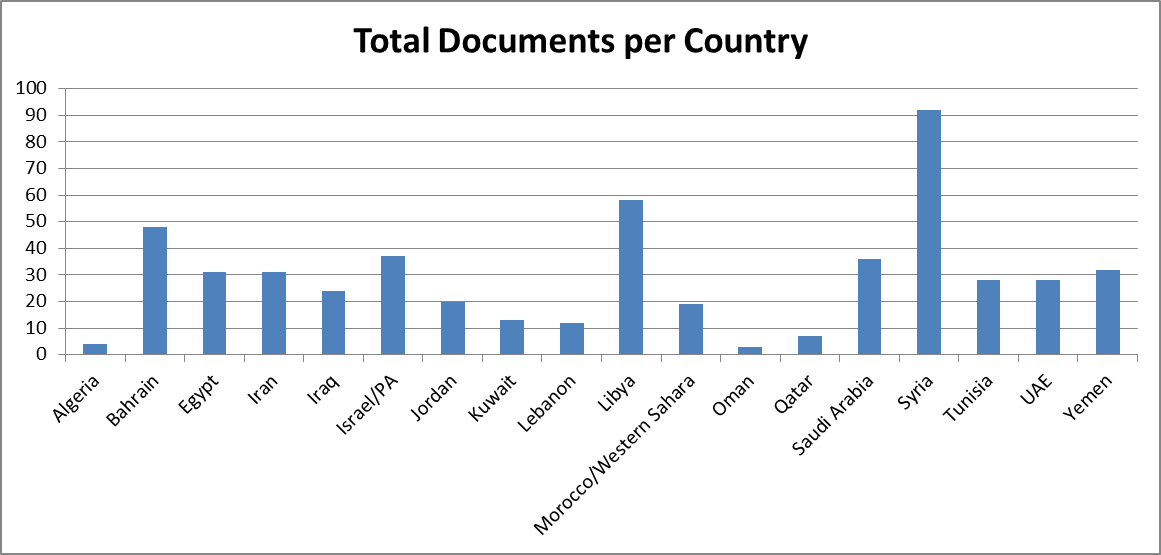
In 2012, HRW issued more reports, press releases, op-eds, and other publications on Syria (92), Libya (58), and Bahrain (48) than on other countries in MENA. Documents on “Israel and the Occupied Territories” [1] comprised 7% of the 2012 MENA total, slightly above last year’s percentage, 6.83, which was the lowest percentage since NGO Monitor’s annual analysis began in 2005.
However, “Israel and the Occupied Territories” (37) still received more coverage than Egypt (31), Iran (31), Tunisia (28), Lebanon (12), Iraq (24), and Yemen (32), and comparable attention to Saudi Arabia (36). In other words, criticizing Israel remains a higher priority for HRW than systematic repression in Iran, violence in Yemen, and the possibility of another autocratic regime in Egypt.
The 92 documents on Syria, in comparison to previous numbers on Israel, also demonstrate the disproportionate attention that was devoted to Israel. In 2009, HRW produced a slightly-greater number of documents (99) on Israel, including dozens of statements on the Gaza conflict and in support of the Goldstone Report. Yet, by all accounts, the civilian death toll in Syria in 2012 (60,000) was more than 60 times greater than the civilian death toll in Gaza in 2009. Additionally, in Syria, the Assad regime has been intentionally targeting the civilian population, in particular political and ethnic opponents, whereas the limited number of civilian deaths in Gaza was due to the operation of Hamas and other Palestinian combatants from within civilian areas and/or faulty intelligence.
Another indication of HRW’s partial attention to non-democratic repressive regimes in the Middle East is the lack of major reports on certain counties. A report on Algeria has not been published since 2008. Similarly, Oman has never been the exclusive focus of a detailed report, and in 2012, Oman was the subject of a press release for only the second time since 2008.
Weighted Analysis
NGO Monitor’s weighted analysis, which reflects resource-consumption and relative impact (i.e., more effort goes into and more impact results from producing a report than a press release – see Appendix 2), shows that HRW devoted the most resources on Syria (391), followed by Libya (239), Bahrain (208), “Israel and the Occupied Territories” (175), Saudi Arabia (157), Yemen (149), and Iran (140). (See Table 2 for an overview; Appendix 3 for full results.)
Table 2 – Weighted Score for 2012 MENA Documents
.png)
In 2012, two full length reports were dedicated to “Israel and the Occupied Territories.” The first, “‘Forget About Him, He’s Not Here’: Israel’s Control of Palestinian Residency in the West Bank and Gaza,” February 5, 2012, made unsubstantiated claims that Israel was limiting residency permits to Palestinians in order to maintain “demographic control” over the Palestinian Authority, as well as unqualified assertions relating to Israeli security needs. The 110-page document was also accompanied by a media blitz, including a press conference at the American Colony Hotel in Jersualem. The second, the 43-page “Abusive System: Failures of Criminal Justice in Gaza,” October 3, 2012, is one of the few HRW reports on the Palestinians not to blame Israel for a given human rights concern. However, like its December 2012 press release on the rockets from Gaza, this report presented little new information and was issued more than five years after the Hamas takeover in Gaza. HRW offered no explanation as to why it took so long to issue this report despite the massive abuses occurring in Gaza since at least 2007.
In addition, MENA focused 50% of its press releases about “Israel and Occupied Territories” on criticism of Israel, 11% on both sides of the conflict, and 39% on human rights violations by the Palestinian Authority and Hamas. These figures represent a significant change from previous years, when HRW systematically ignored on intra-Palestinian violations.
Failing Closed Societies
In his 2009 New York Times op-ed, founder Robert Bernstein criticized HRW for “cast[ing] aside its important distinction between open and closed societies.” Indeed, this trend has continued.
In 2012, Freedom House gave the lowest possible ranking for both political rights and civil liberties to seven countries outside the Middle East: Eritrea, Equatorial Guinea, North Korea, Somalia, Sudan, Turkmenistan, and Uzbekistan.
In sharp contrast, HRW entirely ignored two of these countries (Turkmenistan and Uzbekistan) in 2012, and none was the focus of more than 25 total documents. Israel, on the other hand, was the subject of 37 HRW documents in 2012.
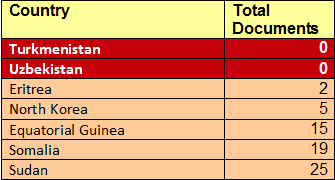
Appendices
This section contains the data behind NGO Monitor’s report on Human Rights Watch’s activities in 2012.
Appendix 1: HRW Emphasis on “Israel and Occupied Territories” 2005 – 2012
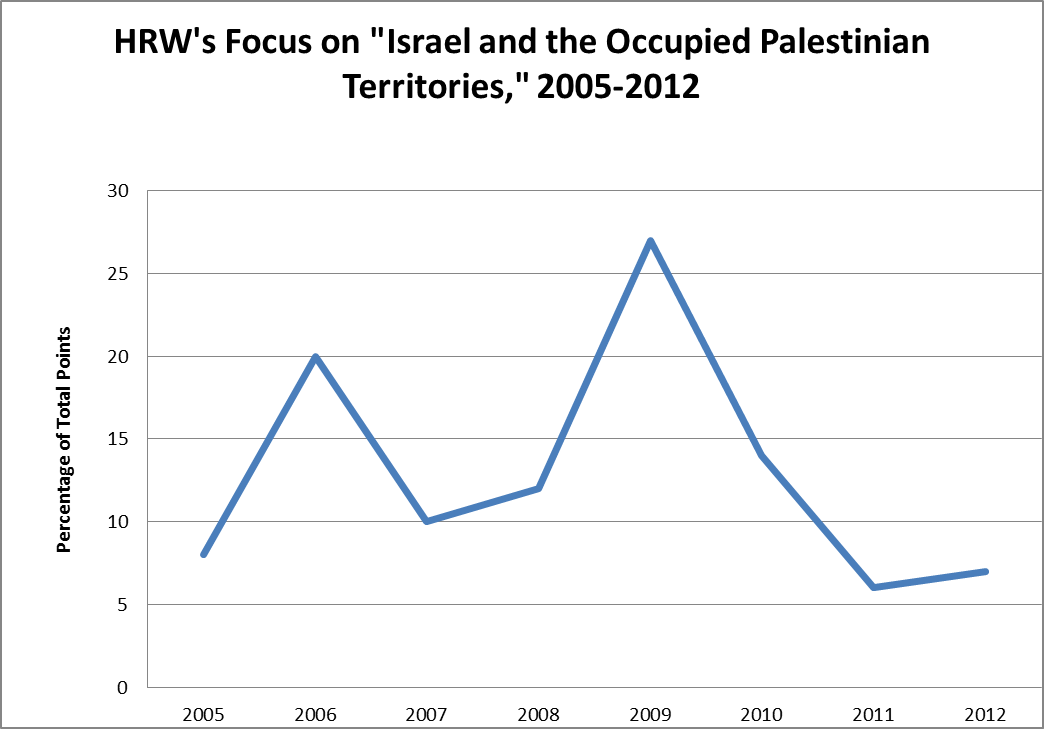
Appendix 2: Measure of Effort

Appendix 3: Documents according to Country
Endnotes:
